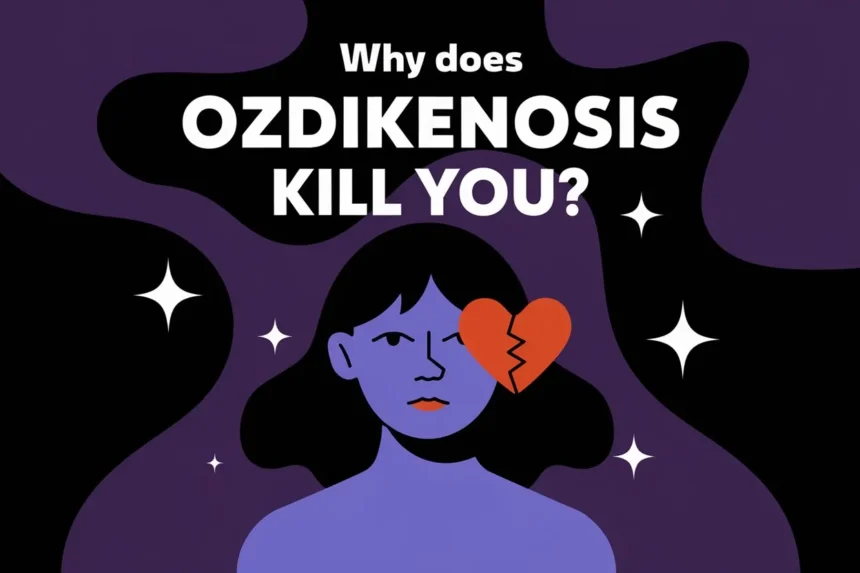Rare diseases often come with layers of mystery, and ozdikenosis is no exception. While its name may not be widely recognized, the condition is extremely serious. In this article, we explore the critical question: why does ozdikenosis kill you? By understanding how this disease works, we can grasp the urgency of early detection, proper diagnosis, and potential treatment.
Ozdikenosis Disease Profile
| Attribute | Information |
| Name | Ozdikenosis |
| Category | Rare Metabolic/Autoimmune Disorder |
| Primary Systems Affected | Liver, Kidneys, Brain |
| Mortality Rate | Estimated 60–80% if untreated |
| Symptoms | Cognitive decline, seizures, fatigue, jaundice |
| Causes | Genetic mutations, toxic buildup, immune dysfunction |
| Diagnosis Tools | Genetic screening, advanced blood panels, MRI, toxicology |
| Treatment | Experimental therapies, detoxification, supportive care |
| First Reported | Early 2000s (clinical speculation) |
What Is Ozdikenosis?
Before we tackle the core question—why does ozdikenosis kill you—we must first define it. Ozdikenosis is a rare and severe medical disorder that likely results from the body’s inability to eliminate certain metabolic waste products. These substances accumulate rapidly and begin to attack critical organs such as the liver, kidneys, and brain.
Why Does Ozdikenosis Kill You?
The answer lies in how the disease affects vital systems:
- Toxic Metabolite Accumulation: The liver fails to neutralize or eliminate certain byproducts, leading to blood toxicity.
- Neurological Deterioration: The brain absorbs these toxins, which trigger inflammation, seizures, and eventually coma or brain death.
- Organ System Failure: Kidney and liver failure happen rapidly, often within days of symptom onset.
- Lack of Early Symptoms: Many patients go undiagnosed until the disease is in its final stages, making treatment difficult or impossible.
This is ultimately why ozdikenosis kills you—the body essentially poisons itself, and without an immediate medical response, survival chances diminish fast.
Common Symptoms of Ozdikenosis
Identifying symptoms early is essential. These often include:
- Sudden fatigue and weakness
- Vomiting and abdominal pain
- Yellowing of eyes or skin (jaundice)
- Confusion and memory loss
- Muscle tremors and seizures
If you experience any of these signs, especially in combination, it’s crucial to seek urgent medical evaluation.
Diagnosing the Disease
Due to its rarity, diagnosing ozdikenosis can be difficult. Physicians often rely on:
- Genetic Testing: To identify faulty metabolic enzymes
- Toxicology Reports: Measuring unprocessed compounds in blood
- Neuroimaging: MRI scans to detect brain swelling
- Liver Function Panels: Checking for early liver failure
These tests can confirm the condition early, which is key to answering why does ozdikenosis kill you—because delay is often fatal.
Is There a Cure?
At present, there is no established cure. However, experimental treatments are in development, including:
- Plasmapheresis: Filtering toxic substances from the blood
- Enzyme Replacement: Still under research for genetic forms
- Intensive Care Management: Controlling seizures, hydration, and infections
Because of the disease’s fast progression, most interventions focus on life extension rather than a cure. This further clarifies why does ozdikenosis kill you—its speed and complexity overpower the body and available treatments.
Prevention and Risk Factors
While full prevention isn’t currently possible, you can reduce your risk:
- Avoid prolonged exposure to environmental toxins
- Maintain liver health through diet and hydration
- Get genetic counseling if you have a family history of rare diseases
Understanding your risk factors may help avoid a medical crisis or support early detection.
Why Awareness Matters
Many fatal diseases remain undiagnosed because of a lack of public and clinical awareness. Medical researchers are still compiling global data on ozdikenosis, and with more knowledge, new therapies could be developed. Spreading awareness is one way to challenge the fatal outcome. The more we understand why ozdikenosis kills you, the better we can fight it.
Conclusion
So, why does ozdikenosis kill you? Because it strikes fast, evades early detection, and overwhelms the body’s detox and defense systems. This rare condition still requires deeper study, but its pattern of toxic build-up, organ failure, and neurological collapse makes it deadly without swift action. Understanding the warning signs and pushing for advanced diagnostics can make a real difference.
Read more: Team Disquantified: Meaning, Reasons & High-Profile Cases Explained
FAQs About Ozdikenosis
A1: Because it causes rapid toxin buildup, leading to multi-organ failure in a short time.
A2: No, it is believed to be genetic or metabolic and cannot be transmitted between individuals.
A3: Not always. It usually requires specialized toxicology and genetic tests for confirmation.
A4: People with genetic enzyme deficiencies or those exposed to environmental toxins may be at higher risk.
A5: Yes, ongoing research into enzyme therapy and detoxification methods offers promise for future care options.











